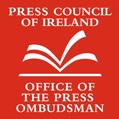Press Council privacy seminar in Cork
…Press Council seminar on privacy
The Press Council is hosting a seminar on the relationship between the press, the internet and privacy at Jury’s Western Hotel in Cork on Friday.
Data Protection Commissioner Billy Hawkes, businessman Ben Dunne and Irish Daily Mirror editor John Kierans are among the speakers at the seminar, which hopes to generate an exchange of views between members of the media and the public.
The seminar, which is free and open to the public, begins at 2pm.






